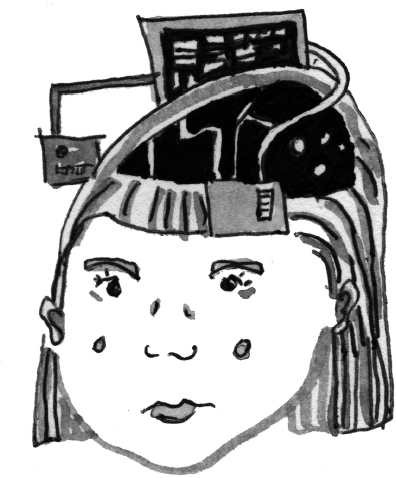
I place an enormous amount of emphasis on the content of thought. I’m interested not just in how you’re thinking, but also what you’re thinking.
When we are thinking and, in particular, thinking about ourselves, each thought is a silent conversation with the self.
If your thoughts are positive, hopeful and optimistic—fabulous! Because as your thoughts move about and become repetitive, they form belief systems. They kindle tracks in your brain that act as pathways to how you feel about yourself, your relationships and your place in the world.
The reverse also applies. (Flick the domino spiral in the opposite direction.) If your thoughts are negative, self-loathing and pessimistic, this too can become a lifetime habit for evaluating yourself.
Of course, the origins of the way you think are to do with a combination of nature and nurture, and how the two interact during your lifetime. This is called epigenetics.
COMPUTER-MIND ANALOGY
If you think about your brain processing information like a computer, the metaphor would be as follows:
· You have a ‘hard drive’, where all your core beliefs and values are stored from way back when. Your early life history, your rolemodelling, your value system.
· Then there is the ‘software package’, where your rules of living and your attitudes are stored. These rules often present in your thinking as the ‘if–thens’. There you are as a child learning about how the world and the people in it work. You notice that if you behave in a certain way then your mother gets very angry. If you behave in a different way, then your mother appears pleased. Another important set of tools for negotiating your environment.
· Then there is the ‘screen’. This is where all your automatic thoughts are displayed. These are the thoughts you are conscious of in your daily life.

Continuing with the computer metaphor, if you have the equivalent of a ‘virus’ in your feedback system, your thoughts become irrational. These irrational thoughts create exaggerated emotions. However, you believe them to be true. Because, why wouldn’t you?
Nobody wakes up in the morning and thinks to themselves, Mmm, I must go and see a therapist, fork out a lot of money, and make sure my thoughts are true. Because 90% of the time the brain is giving us accurate factual information. For example, there is a chair—if I sit in the chair I will have a place to rest. There is a door—if I open that I will be able to go through to the next room. There is a red light—this is where I need to stop.
People don’t initially come to therapy because they are checking the accuracy of their thoughts. They come because of how they are feeling, physically and/or emotionally.
As humans, the only way we know that what we experience of reality is the truth is by trusting the sensory inputs of the brain.
Why would you ever question any information your brain is giving you? You wouldn’t. So, the thought viruses remain unquestioned, but they are distorting the way you think about yourself and the world and leaving you often unhappy and dissatisfied.